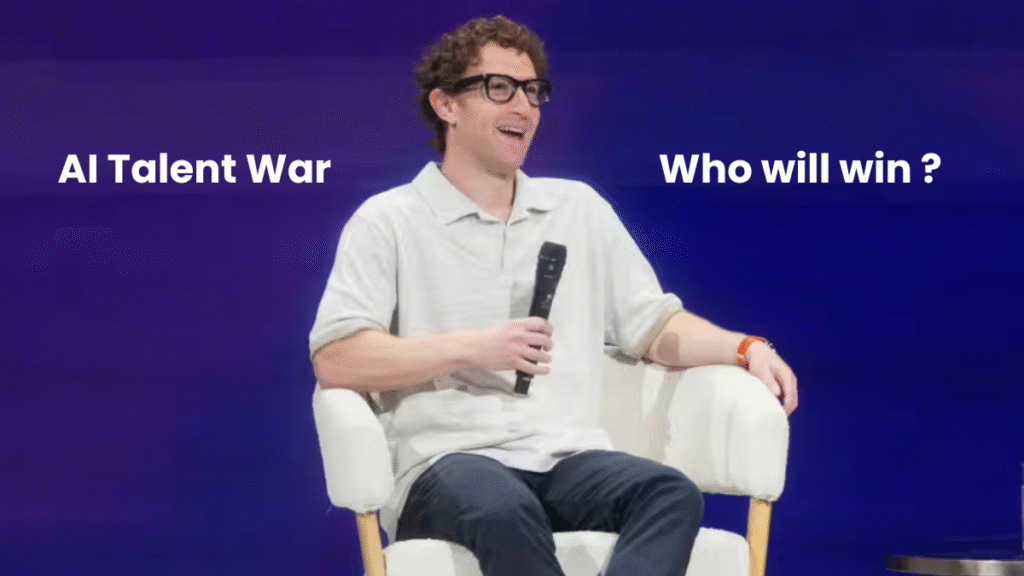The **AI talent war** is heating up, and Mark Zuckerberg is bringing a firehose of cash to the fight in a bid to dominate the future of artificial intelligence. Recent reports reveal the Meta CEO has been personally orchestrating a massive campaign to poach the world’s top AI talent from rivals like Google and OpenAI. But this isn’t just another corporate hiring spree; it’s a high-stakes battle for the very soul of the AI industry, starkly contrasting Meta’s ‘buy the talent’ strategy with OpenAI’s ‘believe the mission’ culture. It begs the question: will cold, hard cash or a compelling vision ultimately build the future?
What You Need to Know
Personal Poaching: Mark Zuckerberg is personally contacting top AI researchers and recent PhD graduates, offering compensation packages reportedly worth up to $100 million.
Clash of Ideologies: The strategy has drawn criticism from OpenAI CEO Sam Altman, who believes focusing on massive paydays over the mission will not create a great long-term culture.
A Sign of Urgency: Meta’s aggressive moves, including a $14bn stake in Scale AI, signal a desperate need to catch up and dominate the AI space after delaying its own flagship model.
The Real Cost: This talent war inflates salaries across the industry, making it harder for smaller players and startups to compete for the brightest minds.
The Billion-Dollar Shopping List
For weeks, Silicon Valley has been buzzing about “the list”—a secret slate of top-tier AI engineers and researchers personally curated by Zuckerberg. According to the Wall Street Journal, he’s been scouring research papers and creating WhatsApp groups with senior execs to coordinate a “transfusion from the country’s top AI labs” directly into Meta.
This isn’t just about hiring a few key people. It’s a calculated, top-down assault to acquire the human capital necessary for AI dominance. The targets range from seasoned experts at Google’s DeepMind and OpenAI to the most promising recent graduates from elite programs at UC Berkeley and Carnegie Mellon.
This aggressive hunt for talent isn’t happening in a vacuum. It underscores a fierce industry-wide competition. According to the Stanford Institute for Human-Centered AI’s 2024 AI Index Report, industry continues to dominate academia in attracting AI talent. In 2022, 54.2% of new AI PhDs went to industry, compared to just 33.1% who chose academia, highlighting the intense competition for top minds. This is the scarce, elite pool that Zuckerberg is now trying to corner with unprecedented financial offers.
Culture Clash: The Mission vs. The Money
Zuckerberg’s strategy has not gone unnoticed. It has drawn pointed criticism from OpenAI’s chief executive, Sam Altman, whose organization prides itself on a mission-driven culture focused on safely developing artificial general intelligence.
In a recent podcast appearance, Altman called the rumored compensation packages “crazy” and highlighted a fundamental difference in philosophy.
“‘I think the strategy of a ton of upfront, guaranteed comp, and that being the reason you tell someone to join… I don’t think that’s going to set up a great culture,'” Altman said. He suggested that focusing so heavily on the paycheck over the work itself is a flawed approach to building a truly innovative team.
This is the central conflict. Meta, still grappling with the public perception of Facebook and a delayed AI model, is using its most powerful weapon: its massive war chest. OpenAI, on the other hand, bets that its clear, ambitious mission is a more powerful magnet for talent that is motivated by more than just money.
From what I’ve seen, this isn’t just about the money. Elite AI researchers want to work on foundational problems with massive resources. The real question is whether Meta’s newly formed ‘superintelligence team,’ led by Scale AI founder Alexandr Wang, offers a compelling enough mission to retain this expensive talent long-term, or if it’s just a golden cage.
The Consequences of the AI Talent War
Zuckerberg’s gambit is more than just a power move; it’s a market-shaping event with serious consequences. By offering nine-figure packages, Meta is dramatically inflating the price of elite AI talent. This may work for giants like Meta, Google, and Microsoft, but it risks pricing out innovative startups and smaller research labs that can’t compete with those salaries.
Ultimately, Meta’s strategy is a bold, if controversial, attempt to buy its way to the top. The company is betting billions that it can acquire the brainpower it needs to leapfrog competitors. Whether this leads to groundbreaking innovation or a dysfunctional, mercenary culture remains to be seen. But one thing is certain: the AI talent war has officially entered a new, brutally expensive phase.

